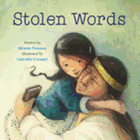
Skipping and dancing home from school, a young girl carries in one hand a dream catcher she's made, and with the other she holds onto her Grandpa. "How do you say grandfather in Cree?" she asks. And suddenly their walk turns somber as Grandpa admits, "I don't remember... I lost my words a long time ago."
Bewildered, the little girl presses, "How do you lose words, Grandpa?" He tenderly explains about the residential schools to which First Nations children were forcibly sent, meant to "assimilate" them and erase their identity: "They took our words and locked them away, punished us until we forgot them, until we sounded like them."
By the next day, the little girl has a plan: "My teacher helped me find this for you at the library," she says, presenting her grandfather with a "tattered well-worn paperback"--a dictionary--in which he finds the soft, familiar words of his past. Together, grandfather (nimosôm) and granddaughter (nôsisim) will reclaim their Stolen Words.
Melanie Florence, of Cree/Scottish descent, won Second Story Press's 2015 Indigenous Writing Contest with Stolen Words, a sobering ode to her heritage, presented through eyes filled with love and hope. Artist Gabrielle Grimard (who previously illustrated Margaret Pokiak-Fenton's two-part residential school memoirs, When I Was Eight and Not My Girl) is Florence's ideal creative partner, enhancing each page with depth and movement, capturing every touch, every gaze with enveloping empathy. Adding a grey overwash on Grandpa's memories proves especially effective in emphasizing the traumas he survived.
Although an afterword with historical context and suggested further reading feels missing here, Florence's narrative couldn't be more affecting. Word by word, her story--written in honor of her Cree grandfather--is a significant step toward forever healing. --Terry Hong, Smithsonian BookDragon

